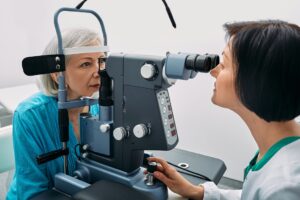
According to a recent study performed by the American Academy of Ophthalmology, 28% of people over the age of 71 have visual impairment even while wearing glasses. It appears that age-related vision problems are no match for prescription lenses, proving once and for all that technology can only help so much when the effects of aging start to set in.
This study is important to discuss as poor vision is associated with several adverse outcomes, including dementia, depression, falls, motor vehicle accidents, and even death. It represents the first national study to assess visual function objectively. The findings showed that different types of visual impairment were associated with older age, less education, and lower income.
Both contrast sensitivity and visual acuity were greater among non-Hispanic Black and Hispanic individuals compared to non-Hispanic white individuals. Lower education and income were also associated with all types of visual impairment.
Previous studies have found that the cost of caring for older adults with vision impairment and blindness in the U.S. was $134.2 billion annually. For older adults to correct their eyesight, they simply need to update their eyeglasses. However, many face financial barriers, so they cannot afford prescription lenses.
Researchers hope this study will help to help improve public health outcomes when supporting adults with visual impairment.
“The up-to-date data presented in this study are vital for informing surveillance of vision health in the U.S. and may enable public health programs to target those at highest risk of poor vision,” said study author Joshua Ehrlich, M.D., M.P.H.
Ensuring Healthy Vision
As this research proves, it is vital to take steps to ensure vision is kept as healthy as possible as you age. One of the primary causes of age-related vision loss is low levels of lutein and zeaxanthin. These natural pigments have been shown to protect the eye from oxidative damage caused by ultraviolet light and environmental factors.
Some of the best sources of lutein and zeaxanthin are available through food, but it is difficult to get enough of these pigments from diet alone. 20/20 Vision contains 20 mg of lutein and 2 mg of zeaxanthin to help give your eyes the nutritional support they require. In addition to those two ingredients, this unique formula also contains various vitamins, minerals, and herbal ingredients to help support and maximize vision and eye health.